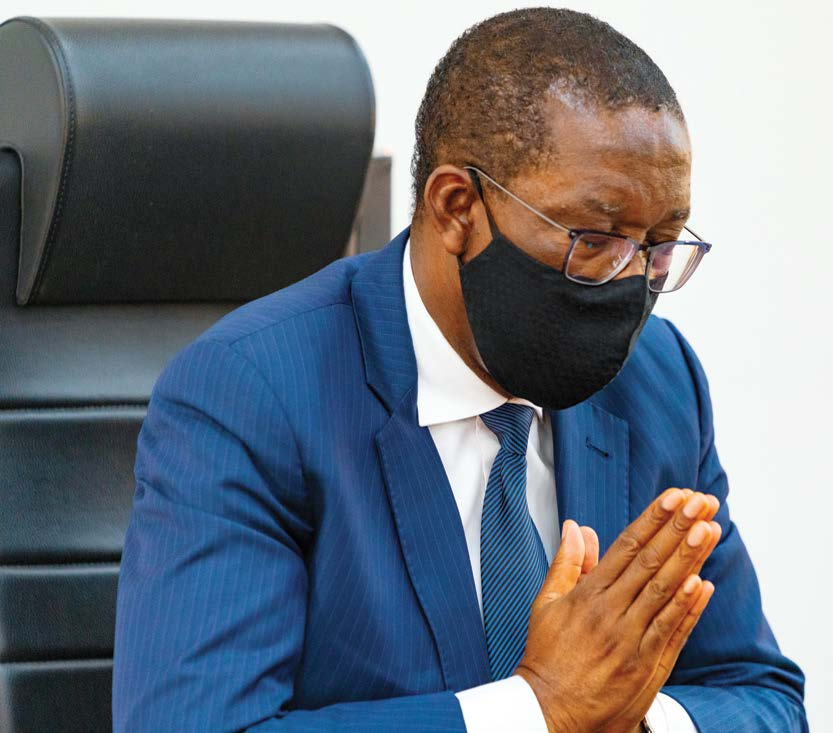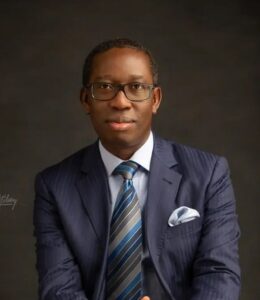
Finishing Strong
On May 29, 2015, he was inaugurated as Executive Governor of Delta State, the first of Anioma extraction to occupy this political office since the creation of the state in 1991. Those familiar with the story of Delta and its ethnic complexity would appreciate better the mountainous race, that soared Okowa to Eagle flight. Whether in Anioma world view or cumulative vision of Delta state, his allegory is legendary, worthy of acclamation. His emergence as governor was a strong seal of approval for Delta North, after a long walk towards validation of self-identity. He got re-elected in 2019 to consummate an 8-year cycle in the Government House. Governor Okowa made monumental efforts to put shine in all quarters across the state. Towns and villages, men and women, young and old have witnessed the good governance phenomenon in full measure, exemplary in Delta political experience.
Through his novel SMART AGENDA policy thrust, which culminated in the STRONGER DELTA theme, reaching a salutary crescendo in the valedictory FINISHING STRONG focus, Okowa ‘s development models, sure-footed and sterling in accomplishments had changed Delta forever The vivid testaments are widespread empowerment of millions of Deltans, through entrepreneurship skills, uplifting political engagements as well as development of social infrastructure, especially universities, secondary and primary schools, bridges, hospitals, markets, rural and urban roads with mega drainages. His famous “ROADMASTER” appellation is a timeless tribute to his amazing track record in providing road networks stretching thousands of kilometers across Delta North, Delta Central, and Delta South senatorial districts. His huge offerings of development, peace, and progress remain uncountable around Delta.
As part of his transformational urban renewal agenda, Asaba as the state capital is painted, pampered like Da Vinci’s “Mona Lisa” with an iconic Prof. Chike Edozien Central Secretariat, archetypal Leisure Park/ Film Village (named after the illustrious daughter of Delta, Maryam Babangida), remodeled International Airport, Specialist hospital, scenic schools and roads decorated with massive drainages among other amenities pleasant to the eye. Wrapped in peace and tranquility, Asaba is now Nigeria’s new destination haven for tourists and investors. With his good breeding, matchless intellect, calm temperament, and sagacious political stature as governor, Okowa gained national visibility and recognition of mythic magnitude. He is a stabilizing figure and symbol of a new Nigeria, steeped in unity, diversity, and collective enterprise toward manifest greatness. It becomes easy to decipher his preference as Vice Presidential candidate for the People’s Democratic Party (PDP) Presidential flag-bearer, Alhaji Atiku Abubakar, in the last election. In Delta State and Nigeria in general, Governor Okowa’s footprints are admired, unforgettable, and indelible from all quarters. On May 29, 2023, he finished Strong and bid farewell to his excellent eight-year gubernatorial experience which was laced with visionary leadership, exemplary service, and integrity.
Early Years
Ifeanyi Arthur Okowa was born on July 8, 1959, to the family of Chief Arthur Uzoma and Madam Victoria Okowa of Owa-Alero, Ika North East Local Government Area. His father was a teacher at St Michael’s Primary School (Anglican) in the village while his mother was a midwife. Theirs was a beautiful Christian home that radiated warmth, joy and peace. It was under this loving Christian atmosphere that Ifeanyi and his seven siblings (three women and four men) were nurtured and groomed. Not surprisingly, the siblings share a unique bond that he has carried over into his family.
His first name, Ifeanyichukwu, (meaning: nothing is impossible with God) was revealed to his father in a dream. The name turned out to be prophetic as the precocious Ifeanyi, despite his physical frailties, showed signs of greatness early in life. At St Michael’s Primary School, he often led other pupils in poetry recitation, concerts and plays. Sometimes, because of his small stature, his teachers placed boxes on top of reading desks for him to stand and deliver his breathtaking performances. His father saw the potential in him and nicknamed him ‘Big-boy,’ a name that has stuck to this day as he has continued to accomplish great things in life.
After his primary education, Ifeanyi enrolled at the prestigious Edo College. He graduated from college at the age of 14. Thereafter, he proceeded for his A-Levels. Whenever he was home on holidays, he organized lectures for students preparing for their School Certificate Examinations. It was an experience that impacted his interpersonal and people management skills and prepared him for higher leadership responsibilities. After his A Levels, he was admitted to study Medicine at the University of Ibadan, the premier University in Nigeria, from where he graduated at the age of 22.
Professional Career
Soon after completing his National Youth Service in 1982, the young Dr Okowa worked briefly with the defunct Bendel State Hospital Management Board as a Medical Officer at General Hospital Igbanke. He later went into private practice to become the Chief Medical Director of Victory Medical Centre in Igbanke and Boji-boji Owa. It was here that his compassionate nature came to the fore as he was quick to offer free medical services to the poor and needy, which was quite unusual for a start-up. He was practically “on call” 24/7; life and support meant the whole world to him. It was during that season of his life that he developed his empathy for the poor, women and the vulnerable.
Family Life
Dr. Ifeanyi Okowa married his sweetheart and soul mate, Edith Mekwuye on 27 December 1986. The thirty-five-year-old marriage is blessed with four children namely; Mildred, Marilyn, Maxine and Marvin. They also have four grandchildren.
They are a close-knit family shining forth the same attributes of love, joy, peace, humility and generosity that characterised his childhood.
Political Odyssey
Dr Okowa’s foray into politics was a clear case of divine providence. Arising from his interactions with the grassroots populace he began attending political meetings with the sole objective of influencing the leaders to formulate policies and programmes to ameliorate the sufferings of the poor and vulnerable. He was still building his professional career and had no intention of leaving it.
Destiny, however, beckoned on him when the political leaders in the then Ika Local Government Area chose him to become the Secretary of the Council in 1991. It was as if they were telling him to come and implement the ideas he had been propounding. Six months later, the Local Government was split into two, namely Ika South and Ika North East Local Government Areas with headquarters in Agbor and Owa-Oyibu respectively. He contested and won the election to become the first Executive Chairman of Ika North East Local Government Council, albeit, for a relatively short period following the truncation of the Third Republic in 1993.
That was the beginning of Okowa’s political odyssey. Since then he has not looked back. When the ban on politics was lifted in 1998, he became a prominent member of the Peoples Democratic Party (PDP). In 1999, he was appointed Commissioner for Natural Resources and Commissioner for Agriculture. He later served as Commissioner for Water Resources and Commissioner for Health. He became Secretary to the State Government in 2007 from where he resigned to contest and won election into the Nigerian Senate in 2011. As a distinguished Senator of the 7th Senate of the Federal Republic of Nigeria, he left an indelible mark as Chairman of the Health Committee, which worked for the promulgation of the National Health Act.
In 2014, under divine direction, he entered the governorship race. Having emerged as the winner of the keenly contested PDP primaries, he was elected Governor of Delta State on April 11, 2015. After a superlative performance in his first term that earned him multiple awards, Governor Okowa was re-elected on March 11, 2019, for another four year-term.
As a politician and public servant, Governor Okowa has carved a reputation for himself as a visionary leader, promise keeper, deep thinker, skilled administrator and unifier, undergirded by his attributes of love, humility, discipline, compassion, large-heartedness and loyalty.
Awards
-
Silverbird ‘Man of The Year’ Award For 2018
-
“2018 Governor of The Year” by Vanguard
-
New Telegraph 2018 Governor of the Year Award (Human Capital Development and Infrastructure)
-
Most Performing Governor in Nigeria for 2018 by Hope Alive Nigeria
-
Infrastructure Governor of the Year (South-South) by the 2018 Nigerian Infrastructural Development Awards (NIDA)
-
Nigeria Olympic Committee (NOC) Merit Award 2018
-
Independent Newspapers’ ‘Man of The Year, 2017’
-
Special Honours Award for Promoting Track and Field Athletics in the African continent.
-
NUPENG’s Award for Peace in recognition of his contributions to Peaceful Oil and Gas Exploration in the Niger Delta region.
-
The African Leadership Good Governance Award for best Governor, Grassroots and People Development
-
Rev Dr. S.W. Martins Memorial Developmental Award
-
Alumni of the year 2016 by the University of Ibadan, Ibadan-Nigeria
-
2016 Mandela Medal Award on Human Rights
-
Dignity of Man Award 2017 by the University of Nigerian, Nsukka
-
Award For Promoting Continental Sports by National Sports Commission

Early Years
Ifeanyi Arthur Okowa was born on July 8, 1959, to the family of Chief Arthur Uzoma and Madam Victoria Okowa of Owa-Alero, Ika North East Local Government Area. His father was a teacher at St Michael’s Primary School (Anglican) in the village while his mother was a midwife. Theirs was a beautiful Christian home that radiated warmth, joy and peace. It was under this loving Christian atmosphere that Ifeanyi and his seven siblings (three women and four men) were nurtured and groomed. Not surprisingly, the siblings share a unique bond that he has carried over into his family.
His first name, Ifeanyichukwu, (meaning: nothing is impossible with God) was revealed to his father in a dream. The name turned out to be prophetic as the precocious Ifeanyi, despite his physical frailties, showed signs of greatness early in life. At St Michael’s Primary School, he often led other pupils in poetry recitation, concerts and plays. Sometimes, because of his small stature, his teachers placed boxes on top of reading desks for him to stand and deliver his breathtaking performances. His father saw the potential in him and nicknamed him ‘Big-boy,’ a name that has stuck to this day as he has continued to accomplish great things in life.
After his primary education, Ifeanyi enrolled at the prestigious Edo College. He graduated from college at the age of 14. Thereafter, he proceeded for his A Levels. Whenever he was home on holidays, he organized lectures for students preparing for their School Certificate Examinations. It was an experience that impacted his interpersonal and people management skills and prepared him for higher leadership responsibilities. After his A Levels, he was admitted to study Medicine at the University of Ibadan, the premier University in Nigeria, from where he graduated at the age of 22.
Professional Career
Soon after completing his National Youth Service in 1982, the young Dr Okowa worked briefly with the defunct Bendel State Hospital Management Board as a Medical Officer at General Hospital Igbanke before going into private practice to become the Chief Medical Director of Victory Medical Centre in Igbanke and Boji-boji Owa. It was here that his compassionate nature came to the fore as he was quick to offer free medical services to the poor and needy, which was quite unusual for a start-up. He was practically “on call” 24/7; life and support meant the whole world to him. It was during that season of his life that he developed his empathy for the poor, women and the vulnerable.
Although he was not financially rich his emotional bank account grew and remain ever so. The families expressed their goodwill and prayers, which have continued to manifest in his life to date.
Family Life
Dr. Ifeanyi Okowa married his sweetheart and soul mate, Edith Mekwuye on 27 December 1986. The thirty-three-year-old marriage is blessed with four children namely; Mildred, Marilyn, Maxine and Marvin. They also have three grandchildren.
They are a close-knit family shining forth the same attributes of love, joy, peace, humility and generosity that characterised his childhood.
Political Odyssey
Dr Okowa’s foray into politics was a clear case of divine providence. Arising from his interactions with the grassroots populace he began attending political meetings with the sole objective of influencing the leaders to formulate policies and programmes to ameliorate the sufferings of the poor and downtrodden. He was still building his professional career and had no intention of leaving it.
Destiny, however, beckoned on him when the political leaders in the then Ika Local Government Area chose him to become the Secretary of the Council in 1991. It was as if they were telling him to come and implement the ideas he had been propounding. Six months later, the Local Government was split into two, namely Ika South and Ika North East Local Government Areas with headquarters in Agbor and Owa-Oyibu respectively. He contested and won the election to become the first Executive Chairman of Ika North East Local Government Council, albeit, for a relatively short period following the truncation of the Third Republic in 1993.
That was the beginning of Okowa’s political odyssey. Since then he has not looked back. When the ban on politics was lifted in 1998, he became a prominent member of the Peoples Democratic Party (PDP). In 1999, he was appointed Commissioner for Agriculture and Natural Resources. He later served as Commissioner for Health and Water Resources. He became Secretary to the State Government in 2007 from where he resigned to contest for and won election into the Nigerian Senate in 2011. As a distinguished Senator of the 7th Senate of the Federal Republic of Nigeria, he left an indelible mark as Chairman of the Health Committee, which worked for the promulgation of the National Health Act.
In 2014, under divine direction, he entered the governorship race. Having emerged as the winner of the highly contested PDP primaries, he was elected Governor of Delta State on April 11, 2015. After a superlative performance in his first term that earned him multiple awards, Governor Okowa was re-elected on March 11, 2019, for another four year-term.
As a politician and public servant, Governor Okowa has carved a reputation for himself as a visionary leader, promise keeper, deep thinker, skilled administrator and unifier undergirded by his attributes of love, humility, discipline, compassion, large-heartedness and loyalty
Awards
-
Silverbird ‘Man of The Year’ Award For 2018
-
“2018 Governor of The Year” by Vanguard
-
New Telegraph 2018 Governor of the Year Award (Human Capital Development and Infrastructure)
-
Most Performing Governor in Nigeria for 2018 by Hope Alive Nigeria
-
Infrastructure Governor of the Year (South-South) by the 2018 Nigerian Infrastructural Development Awards (NIDA)
-
Nigeria Olympic Committee (NOC) Merit Award 2018
-
Independent Newspapers’ ‘Man of The Year, 2017’
-
Special Honours Award for Promoting Track and Field Athletics in the African continent.
-
NUPENG’s Award for Peace in recognition of his contributions to Peaceful Oil and Gas Exploration in the Niger Delta region.
-
The African Leadership Good Governance Award for best Governor, Grassroots and People Development
-
Rev Dr. S.W. Martins Memorial Developmental Award
-
Alumni of the year 2016 by the University of Ibadan, Ibadan-Nigeria
-
2016 Mandela Medal Award on Human Rights
-
Dignity of Man Award 2017 by the University of Nigerian, Nsukka
-
Award For Promoting Continental Sports by National Sports Commission

